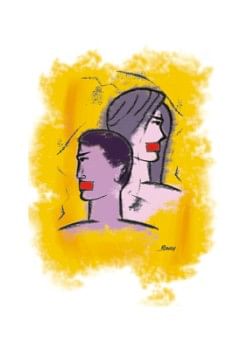
By Reesana Sifat Siraj
I sometimes marvel at the patriotism of Language movement veterans, to have walked straight into death's den solely for their mother tongue's sake on the 21st of February 1952. I wonder what Rafiq, Jabbar, Barkat had in mind last, as they surrendered to death. I wonder which vision fleeted across their eyes last, before their final closure. Did they, that instant, foresee that their sacrifice would present the 14 crore people of Bangladesh, with the right to speak in Bengali? Had they known that someday, their martyrdom would be graced as the International Language day? Did they know that, in the 55 years between 1952 and 2007, Ekushey February would be torn between celebration and mourning?
 If you wish to be enticed only by the practical facet of Ekushey February, please go ahead. Get yourself a good black-and-white 'alphabetical' sari or punjabi from the boutiques that have brought out individual Ekushey lines; go deliver a bouquet of flowers, at Shahid Minar to pay homage to the martyrs; listen to the innumerous people singing 'Amar bhaiyer Rokte...' on the streets; visit the Ekushey Book Fair; have a hearty Bengali meal at one of the eat-outs offering Ekushey packages; come back home. And forget everything the next day.
If you wish to be enticed only by the practical facet of Ekushey February, please go ahead. Get yourself a good black-and-white 'alphabetical' sari or punjabi from the boutiques that have brought out individual Ekushey lines; go deliver a bouquet of flowers, at Shahid Minar to pay homage to the martyrs; listen to the innumerous people singing 'Amar bhaiyer Rokte...' on the streets; visit the Ekushey Book Fair; have a hearty Bengali meal at one of the eat-outs offering Ekushey packages; come back home. And forget everything the next day.
If you wish to grieve the day away, go join the Probath Ferry; cry your heart out watching bereaved family members of the Language movement martyrs; emotions being the food of the day, devour more of it. And since you are the sort who takes everyday as it comes, wake up next morning void of all on-goings of the past day.
No. This is not what Ekushey February is aimed at. Ekushey February is that red-letter day in our history when a fast mounting wrath in the Bengali population in 1952 against accepting Urdu as the national language, finally erupted when the voices of 'Rashtrobhasha Bangla Chai' confronted bullets of the Pakistani forces. Had this face-off not occurred, the underlying issues against accepting a foreign mother tongue would never have come to light and Bangla would thus never have been our national language. In effect, we would never have fought a war for an independent Bangladesh (notice how even our country is named after our language) and would thus have remained East Pakistanis. The people, who gave up their lives to institute Bangla as a mother tongue, don't suppose you only to mourn or celebrate their martyrdom. It is the fortitude of their struggle that, whether you have instilled in you or not, matters. Fête or bereavement, whichever way you take it---is important definitely. But only if it is done with genuine, true feelings and respect. Sit at home; say a little prayer for the martyrs; pay a quiet salute to their devotion and sacrifice; and most importantly, remind yourself not to smirk every time you say 'ami-bhalo-bangla-bolte-parina'. And this may be the best paid tribute to the spirit of Ekushey. Knowing other languages is a thing of pride, undoubtedly but not knowing your mother tongue is a big-time shame.
Plus, why pinpoint a day to pay respect to your mother tongue? You esteem your language every time you address the person next to you in Bengali. Every time you buy a Bengali book, you know there is reverence for your language in you. You know Bangla appeals to you every time the song 'Ami banglae gan gai...' enthralls you. You hold veneration for your language when you defy the temptation of distorting your language with the 'banglish' lingo. And most notably, you know you have your mother tongue at heart when a court order does not have to remind you to carry out judicial work in Bengali. Why demean the spirit of resistance that united us as Bangalees and even lead to our sovereignty?
If a country like Sierra Leone can adopt Bangla as their second language, we Bengalis should not just link the practice of our language to keeping us Bengalis anymore. But Bangla should be practiced, studied as a global language by ourselves first, to further promote its international stature. If we shun Bangla to a side and embrace foreign languages only, how can we expect the world to appreciate the significance of the International language day?
I am not saying that one must give up mastering other languages, to have regard for the mother tongue. In this world of globalization, to live one must be fit. Foreign languages offer scopes for our attaining fitness. And English being the most extensively practiced lingo in the world, helps serve the purpose. Look at it this way, Rabindranath Tagore would never have been the first Bengali Nobel Laureate had Geetanjali not been translated in English for the world to read. Dr Yunus's works, though rendered originally in Bengali, had to be communicated through the most global of all languages, English, for the world to recognize and honor him with a Nobel Prize.
I would not have been writing this and you would not have been reading this, had it not been for English.
Neither of the languages deserves to be prejudiced against. You can neither be entirely anti-Bangla nor a Bangla freak. A balance between the two is of the essence, in this age. You need one to fetch you competitiveness and the other to tie you to your roots. Why not master both and proceed?
